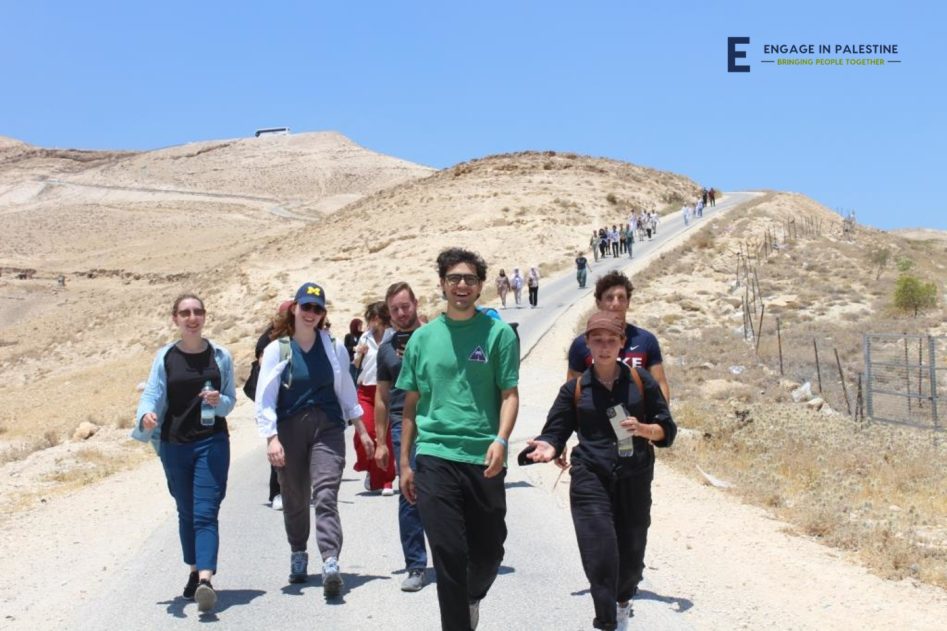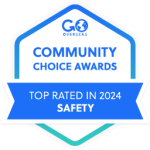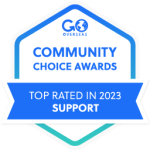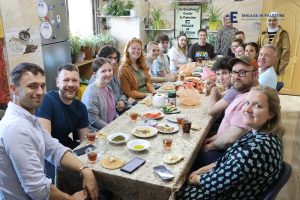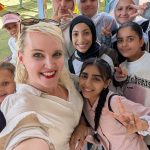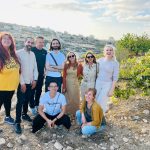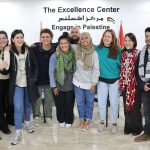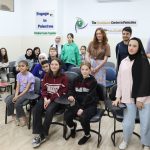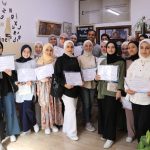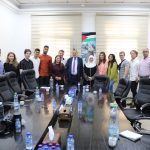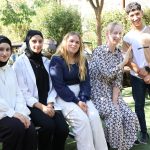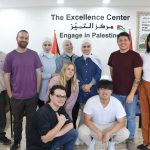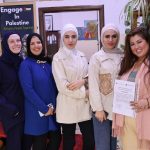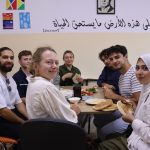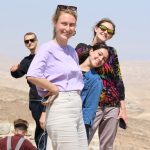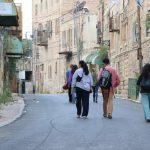Immersion, Tours, And Excursions: Engage in Palestine proudly offers all of our international participants an immersion in Palestine, as well as tours and excursions included as part of their program, no matter whether they choose a short-term volunteer program, internship, or intensive Arabic course with us. We will outline our immersion, tours, and excursions below so that you can better understand what you can expect during your time with us.
Table of Contents
Immersion
Engage in Palestine offers an immersive experience to all of its participants, although the level and type of immersion will vary depending on your selected program. During your time with us, you will experience several elements of immersion, which we will outline below, including an immersion in the Arabic language, Palestinian cuisine, culture, and daily life.
Arabic Language Immersion
For example, our Arabic students will have extra immersion, particularly in Arabic. When you study an intensive Arabic course with us, you are immersed in Arabic for several hours each day inside the classroom and even more time outside of class.
However, even if you are not doing a dedicated study Arabic program, you will still have several hours of Arabic classes per week and be immersed in the language in your everyday life.
Immersion In Palestinian Culture & Daily Life
You will be immersed in Palestinian culture and daily life during your time with us. Each day, you will experience daily life in Palestine for yourself and witness it in the local community. You will also get to learn a lot about Palestinian culture through being immersed in it during your tours and excursions with us and through your own experiences in your free time. There are many intricacies of Palestinian culture you can learn about through making observations, talking with locals, and asking questions. You will also get to learn about Palestinian hospitality in the best possible way – by experiencing it first-hand!
Immersion In Palestinian Cuisine
At our center each day (except Fridays), we provide a community breakfast for all our international participants and staff. You won’t find toast or cereal at our breakfast because we make a traditional Palestinian breakfast for you each day. Our breakfast usually has different dishes daily, allowing you to try many different Palestinian foods.
If you like cooking, it’s always a treat to visit supermarkets and markets in foreign countries to see what products are available and local ingredients. When eating out, most of the restaurants and cafes you will find serve Palestinian food. This allows you to be truly immersed in Palestinian cuisine and try many different delicious dishes!
Tours
One of the key benefits of joining Engage in Palestine, whether for volunteering, an internship program, or an intensive Arabic course, is the tours that we include as part of your program. We include several tours as part of your program, which may vary depending on the time of the year and the type of program you do. We will outline our two most popular tours below.
Tour Of The Old City
During your time with us, one of our knowledgeable local tour guide staff will take you on a guided tour of Hebron’s old city in English. This includes learning about and visiting important sites in the old city, navigating checkpoints, going to Ibrahimi Mosque, and learning about its history. There is much to see in the old city, which is a UNESCO World Heritage site. It is full of beautiful architecture and shops selling various products.
Tips For This Tour
This tour usually lasts between 2-3 hours and requires a lot of walking. We recommend wearing sunscreen and bringing a bottle of water with you.
Note About Visiting Ibrahimi Mosque
Note that non-muslims cannot visit Ibrahimi Mosque during prayer time, so we schedule our tours to avoid this issue. We strongly recommend ankle-length bottoms to anyone visiting Ibrahimi mosque and make sure your shirt has sleeves. Everyone must take off their shoes to enter a mosque, so we recommend wearing comfortable shoes (you will be walking a lot!) but easy to take off for your convenience. All of our non-muslim female participants will be given a hooded cloak to wear at the mosque entrance to ensure they can enter it respectfully.
Tour Of Shuhada Street
Shuhada Street (“Shuhada” means “Martyrs” in English) is one of the main streets in the old city of Hebron, however it has been closed off and divided into sections by the Israeli occupation. One of our Palestinian tour guides will take you around Shuhada Street and to Tel Rumeida on this tour. Tel Rumeida is an area where a number of Palestinians live in very difficult circumstances, surrounded by Israeli settlers. This means Palestinian residents are subjected to daily attacks, harassment, and violence by Israeli settlers.
One Of The Busiest Streets Is Now A Ghost Town
Shuhada Street was once the main lifeline of Hebron. It was a bustling and busy street full of shops and vendors, and it was of tremendous economic value. Today, much of Shuhada Street is like a ghost town. Hundreds of the shops have been permanently closed, with many welded shut by the Occupation, and a number of Israeli settlers have taken over Palestinian homes along this street and in this area.
Palestinian Access To Shuhada Street
Some parts of Shuhada Street can only be accessed through an Israeli military checkpoint. The only Palestinians allowed past are the ones who have special permission and live there. Their families cannot even go to visit them there. Our Palestinian staff are only allowed through this checkpoint when they are with our international participants or other international visitors.
Tips For This Tour
Shuhada Street and Tel Rumeida are both in the H-2 area of Hebron, so you must bring your passport and visa as you will likely need them to pass through the Israeli military checkpoints that separate these areas from the rest of Hebron. Also, remember to wear comfortable walking shoes and sunscreen, and bring a bottle of water with you.
Excursions
Another component of your experience with us at Engage in Palestine is the excursions we include as part of your program. Depending on your individual program choice, you will have different excursions included.
Excursions To Local Artisans And Factories
Typical excursions, no matter which program you have chosen, include a glass and ceramics factory, where you can have the chance to see how glass is blown, how glass products are made, and how ceramics are made or painted by hand. We also recommend you visit the Herbawi textile factory, also known as the keffiyeh factory, as this is the last remaining keffiyeh factory in Palestine. Here you can see how keffiyehs are made and have the chance to buy keffiyehs in a range of colours.
Other Excursions
Other opportunities for excursions include local artists, local human rights and women’s rights organizations, Bedouin areas such as Susiya, Yatta, and Massafer Yatta, local schools and universities, local hospitals, the Hebron municipality, refugee camps such as Al-Fawwar and Al-Aroub camps and more. If you have a particular interest in a certain topic or field, such as art, music, and so on, you can let us know after you arrive in Palestine, and we can try our best to arrange an extra excursion for you.
Program-Specific Excursions
Depending on your program, you may have program-specific excursions. For example, if you volunteer in medicine and healthcare with us, your program will include additional visits and excursions to clinics and other medical facilities. If you are interning in law and the legal system with us, you will have additional excursions to lawyers, law courts, and other relevant places. If you volunteer to teach English in the West Bank, you will likely have additional visits to refugee camps and/or local villages to teach English there.
In Conclusion
While interning, volunteering, or studying with Engage in Palestine, you will have an immersive experience of Palestinian culture, daily life, food, and the Arabic language. We will also take you on several tours and excursions during your program, which will also help immerse you in Palestine and allow you to learn more about Palestinian culture, history, and life under Occupation.
